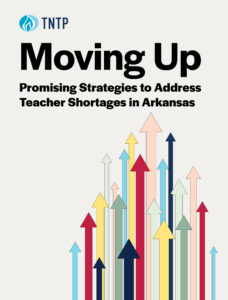This week, we’re taking a look back at our first-ever policy report, Missed Opportunities: How We Keep High-Quality Teachers Out of Urban Classrooms. When it was published in 2003, teacher shortages in urban districts were assumed to be caused by a dearth of qualified applicants. But we quickly discovered that that was not true—and there were things districts could do right away to hire their best-qualified candidates long before the school year began.
In the past decade, school leaders have made great strides toward hiring teachers early—and are seeing the benefits of that shift. Today, we hear from Principal Teri Evans of Kate Bond Elementary School in Memphis, where, as we wrote yesterday, district and school leaders have implemented a talent-focused set of teacher policies.
Before you were able to hire early, how did the hiring process work?
 It was not as organized, and the window to search, interview and hire was narrow. (In the past, hiring in Memphis generally started in July; in the past four years, the district has started hiring teachers in February, with the majority of new hires already on-boarded and on-staff by July. –ed.) All of the schools were interviewing at the same time. To get their foot in the door, candidates would drop off their resumes in person, or have friends and relatives call on their behalf. They were hoping to be granted an interview on sight. We were selecting among those teachers who happened to contact us.
It was not as organized, and the window to search, interview and hire was narrow. (In the past, hiring in Memphis generally started in July; in the past four years, the district has started hiring teachers in February, with the majority of new hires already on-boarded and on-staff by July. –ed.) All of the schools were interviewing at the same time. To get their foot in the door, candidates would drop off their resumes in person, or have friends and relatives call on their behalf. They were hoping to be granted an interview on sight. We were selecting among those teachers who happened to contact us.
Now, teachers who are interested in working in my district submit applications online, and principals have the opportunity to go through that pool of applicants and screen them, based on the specific needs we have at our schools. Then, we select candidates for phone interviews, which gives us a chance to have meaningful conversations, and decide whether to schedule an in-person interview.
With the process beginning earlier, we are able to attract candidates who might otherwise have accepted positions with school systems that began hiring earlier than ours. Earlier hiring also means we have time to contact references, and can reasonably extend offers to candidates who must relocate before the start work.
Is it helpful to hire early?
Hiring early is a great option for us. You just have a larger pool to select candidates from. If you wait until school starts, the pool dries up because other schools are competing for candidates. If you’re proactive and find someone early, you can find someone who is a really good fit.
A longer timeline also allows us to hire candidates who may live outside of Memphis or out of state, which gives us more opportunities to attract the staff that we’re looking for. If you wait until the last minute, those candidates are gone because everyone wants the best teachers they can get.
What does early hiring allow you to do that you couldn’t do otherwise?
We like to arrange for teachers to come in and teach a model lesson. It’s so important, but arranging that takes time, and at the last minute you cannot do that. Seeing a model lesson and expertise in the content area is important for us.
I also want to establish relationships with teachers prior to their coming to our school. I want to build a relationship, talk about housing and help them make their transition. The first in-service meeting is the last of July. Teachers need to be able to get into the building, get settled and be ready for the children to arrive, so July is just too late. I’m trying to get teachers in April and May. The earlier you can start, the better.
Can you talk about a teacher who you hired early? Was your ability to move quickly a factor in getting him or her on board?
 We have done a lot of early hiring this year, and I have had an opportunity to hire some great teachers. One is Mrs. Svoboda Morton.
We have done a lot of early hiring this year, and I have had an opportunity to hire some great teachers. One is Mrs. Svoboda Morton.
When she visited our school, we asked her to do a literature lesson off the cuff, alongside a master teacher. It was great to really see her in the classroom; even though our interview had been great and she had answered all of the questions well, it was the model lesson that sealed the deal.
Now, it was April when she visited. Had we not been doing early hiring, she would have had to wait until July or August. But we were begging for her, because the fit was right. So the district opened up the position early for us, and we hired her right away.
What advice would you give to principals who want to hire early?
Principals who want to hire early really need to know what kind of candidate they’re looking for, so when they start their interview process they can bring out what they need from the candidates. Principals also have to take the leap of faith that it’s okay to hire someone that they don’t know well.
You also have to be willing to use technology, to be flexible about your interviews. We have a physical education teacher here who came from New York who was interviewed by video chat at 7:00 o’clock at night. You have to be flexible and do whatever it takes to get that interview.
What do you think other school systems should do to empower principals to hire early?
School systems could give their principals the flexibility that we have been given, to interview widely and hire early. And they should provide opportunities for principals to use technology to attract the right candidates to their schools.
This year I had seven vacancies to fill, and we had a lot of early hiring. I hired a teacher who had just come in from Afghanistan, another from Knoxville and the teacher from New York. By moving up our hiring season, we were able to attract some really great candidates, and I had the time to really speak with them and find out more about them before deciding whether they would be a good fit at my school. And they had time to find out more about our school, to. Building that relationship is so important, and it helped us bring the right teachers to our students.







